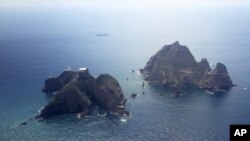South Korea has denounced a move by Japan to approve new middle school textbooks referring to a disputed set of islands in the Sea of Japan by the Japanese name only.
The South Korean foreign ministry on Tuesday released a statement saying the textbooks distort history by claiming the disputed islands are Japanese, without explaining the history of the conflict over them. The ministry summoned Japan's ambassador in Seoul to complain about the textbooks, which were approved by Tokyo on Monday.
A statement by the South Korean foreign ministry on Tuesday said Japan's decision describes "hard historical facts in a way that they are distorted, understated, and/or omitted." South Korea says the islands -- known as Dokdo to South Koreans but Takeshima to Japanese -- are "unequivocally an integral part of the territory of the Republic of Korea in terms of history, geography, and international law."
The statement said Japan's refusal to change the wording in the textbooks indicates its intent to repeat past wrongdoings.
Tokyo said all textbooks will refer to the islands as part of Japan's territory.
Japan occupied the Korean Peninsula from 1910 to the end of World War II in 1945. That history has left a legacy of bitterness toward Japan among some Koreans.
Meanwhile, China also urged Japan on Tuesday to properly educate its youth. Japan and China have a dispute over East China Sea islands known as the Senkaku in Japan and the Diaoyu in China.
China's Foreign Ministry spokeswoman Hua Chunying said Japan should “adopt a responsible attitude toward history” and “educate the next young generation with correct historical views.”
“No matter what means Japan adopts to publicize its mistaken position, there is no way it can change the fundamental fact that the Diaoyu Islands belong to China,” Hua told reporters at a regular briefing.
Japan should reflect on its history of militarism and wartime atrocities in Nanjing, Hua said, referring to the 1937 massacre in which China says Japanese troops killed 300,000 people in what was then Chinese capital.
The protests over the textbooks came just weeks after the foreign ministers of the three countries pledged to improve ties and overcome tension caused by history and territorial disputes, and to try to work for a summit meeting of their leaders soon.
Japan-China ties remain cool despite Japanese Prime Minister Shinzo Abe meeting Chinese President Xi Jinping for the first time last November. South Korean President Park Geun-hye has yet to have a two-way summit with Abe.
Some material for this report came from Reuters.





